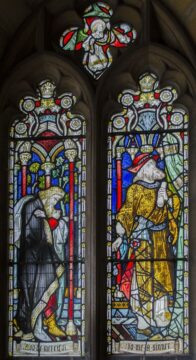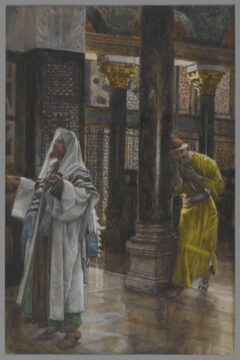Franciscan Friar Fr. Paul Gallagher reflects on the Gospel for the Thirtieth Sunday of Ordinary Time, October 23, 2022. The content is edited by Franciscan Sister of Christian Charity Sister Anne Marie Lom and Joe Thiel. The excerpts from the Sunday readings are prepared by Joe Thiel. To read or download the complete pdf with excerpts for your prayer, please click here: Franciscan Gospel Reflection October 23 2022. Excerpts are from the Lectionary for Mass for Use in the Dioceses of the United States of America, second typical edition © 2001, 1998, 1997, 1986, 1970 Confraternity of Christian Doctrine, Inc., Washington, DC. Used with permission. All rights reserved. No portion of this text may be reproduced by any means without permission in writing from the copyright owner. Photo: [[File:Stained glass window, St James’ church, Louth (20404460408).jpg|Stained glass window, St James’ church, Louth (20404460408)]] [[File:Tissot The Pharisee and the publican Brooklyn.jpg|Tissot The Pharisee and the publican Brooklyn]]
 Luke 18:9-14
Luke 18:9-14
Jesus then addressed this parable to those who were convinced of their own righteousness and despised everyone else. “Two people went up to the temple area to pray; one was a Pharisee and the other was a tax collector. The Pharisee took up his position and spoke this prayer to himself, ‘O God, I thank you that I am not like the rest of humanity–greedy, dishonest, adulterous–or even like this tax collector. I fast twice a week, and I pay tithes on my whole income.’ But the tax collector stood off at a distance and would not even raise his eyes to heaven, but beat his breast and prayed, ‘O God, be merciful to me a sinner.’ I tell you, the latter went home justified, not the former; for everyone who exalts himself will be humbled, and the one who humbles himself will be exalted.”
Background:
The gospel for last week was largely a parable that told of a persistent widow and unjust judge. In the last line of that text Jesus asked, “But when the Son of Man comes, will he find faith on earth?” (Luke 18:8b) That line leads into the text that is the gospel this Sunday.
The gospels themselves give a distorted impression of the Pharisees. At the time of Jesus, they were respected as people who took their relationship to God seriously, and they tried to live out their relationship with God in their daily life. It is very likely that Jesus admired their dedication. Later, after the destruction of the temple, they clashed with the Christian community. Because the gospels were compiled during this later time period, texts like this one reflect that hostile attitude rather than Jesus’ own.
 The tax collectors were generally shunned by the people of Jesus’ day because they collected money for the oppressing government in Rome. They were not paid a wage, and therefore they were expected to collect more than was required. They were known to use weights on the scales that were fixed and not accurate, to their own benefit. If a tax collector desired to repent of his sin, he was required to return all tax money he had collected, plus twenty percent. The longer one had been a tax collector, the more impossible this requirement became. The tax collector in prayer is described as standing at a distance and beating his breast. Such a gesture would be appropriate for a woman. For a man to pray in this fashion would express the deepest sorrow.
The tax collectors were generally shunned by the people of Jesus’ day because they collected money for the oppressing government in Rome. They were not paid a wage, and therefore they were expected to collect more than was required. They were known to use weights on the scales that were fixed and not accurate, to their own benefit. If a tax collector desired to repent of his sin, he was required to return all tax money he had collected, plus twenty percent. The longer one had been a tax collector, the more impossible this requirement became. The tax collector in prayer is described as standing at a distance and beating his breast. Such a gesture would be appropriate for a woman. For a man to pray in this fashion would express the deepest sorrow.
In the parable, the Pharisee is a model in the way that he prays and in daily life. In his daily life he has not entertained greed, dishonesty or adultery. His personal practice exceeds what is required. The requirement to fast is on the Day of Atonement, but he fasts twice a week. The requirement is to pay taxes on what one earns, but he pays the tax on all that he owns. The tax collector prays for mercy and makes no effort to correct the Pharisees’ description of him, so it seems that he has been accurately described. The difference between the two is also expressed in their manner at prayer. The tax collector stands at a distance, does not dare look toward heaven, and beats his breast. His awareness of his relationship with God and how he has lived his life leads him to acknowledge his sin and ask for mercy. The Pharisee’s life is the opposite of the tax collector’s, and so also is his prayer. He drew close, looked toward heaven, and raised his arms toward God when he prayed. His prayer is that he is grateful that he is not like others.
In the final verse Jesus uses opposites to make his point clear. The opposites are in how the two men look upon themselves and in how God looks upon each of them. God looks with compassion on the tax collector who asks for mercy. The Pharisee, who in his prayer took credit for his virtue, does not ask anything from God, and he does not receive anything from God.
Reflection Questions:
- Do you know people who take their commitment to be a disciple seriously? How is this commitment expressed in how they live their lives?
- Do you know people who are active members of AA or other recovery programs? How do you experience their commitment to their recovery? What is your experience of their assessment of themselves?
- Have you encountered people who seemed be impressed with their holiness? Have you also encountered people who were unassuming in their personal relationship with God?
- Have there been periods in your own life when you were operating from the assumption that you needed to earn God’s love? How did that affect your relationship to God, to others, and to yourself?
- Are you more apt to talk about the good qualities of another, or about their faults?
- How and when do you experience sorrow for your sinfulness?
- Do you ever experience resistance to expression of sorrow?
- Can you take some time to talk honestly to God about your relationship to God, how you look upon others, and how that impacts your relationship to God?


